英国酒店管理学Dissertation毕业dissertation写作注意事项:Service quality in Brighton restaurant (UK)

11-07, 2013
AIM OF THE PROJECT 项目目标
This study will focus on service quality in Brighton restaurants (UK) and identify what variables are the key issues, which influence service quality in these restaurants. To further analyse the importance of service quality in Brighton restaurants and how service quality reflects on service failure identification and successful service recovery.这项研究将集中在服务质量布莱顿餐厅(英国) ,并确定哪些变量的关键问题是,在这些餐馆影响服务质量。为了进一步分析在布赖顿的餐馆服务质量的重要性,如何保证服务质量体现在服务故障识别和成功的服务补救。
OBJECTIVES目标
1. To gather and critically analyze relevant literature on service quality standards within the particular reference to hospitality restaurant running. (Secondary methods)1。收集和批判性地分析相关文献的服务质量标准,好客的餐厅运行在特定的参考。 (次级的方法)
2. To gauge how aware owners, managers and staff are of service quality standards and service recovery techniques and if they make any conscious/unconscious changes to their behavior. (Primary and secondary methods)2。为了衡量如何知道的所有者,管理者和工作人员的服务质量标准和服务恢复技术,如果他们做任何有意识/无意识的改变他们的行为。 (小学和中学的方法)
3. To develop and conclude a set of recommendations on how to improve the service quality and training provided to staff by managers or owners and how this could be updated and effective. (Primary and secondary methods)3。要制定和缔结了一系列建议,关于如何提高服务质量,为员工提供培训经理或业主,以及如何可以更新和有效。 (小学和中学的方法)
METHOD方法
KEY FINDINGS主要调查结果
Part I: Consumer Dining Habit and Needs on Service第一部分:消费者餐饮习惯和服务需求
About two third of consumers often dine out.大约三分之二的消费者经常外出吃饭。
Celebrating is the most prevailing dining occasion (62%) vs. other occasions (“too busy in a day” 38%, and “many optional meals” 17%, etc). This indicates that consumers expect from the meal is more than “just for filling”. If the occasion is for celebrating, there will be higher expectation on service.庆祝是最盛行的餐饮场合(62%)与其他场合( “太忙一天” 38 %, “许多可选餐”的17 % ,等等) 。这表明消费者的期望就是一顿超过“只是为了填充” 。如果是为庆祝之际,会有更高的期望服务。#p#分页标题#e#
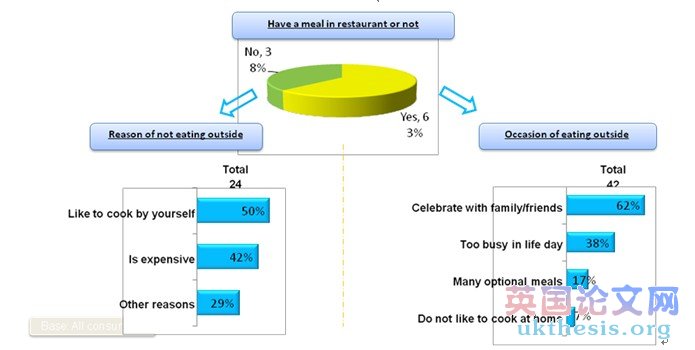
Tasty and healthy food is still the most important to diner. Except this basic needs on food, service related requirements also emerge as important expectation.
Most consumers think service is important (95%) and many of them think it is very important (58%).
Consumers care a lot the happy experience and friendly staff which bring holistic dining enjoyment.
A lot of expected services are related to staff: staff looking friendly and polite, enough time and knowledge to response, and understand customer’s needs.
It is interesting that consumers care more the attitude of the staff: being friendly and polite. The service attitude is rated higher over service knowledge and skill.
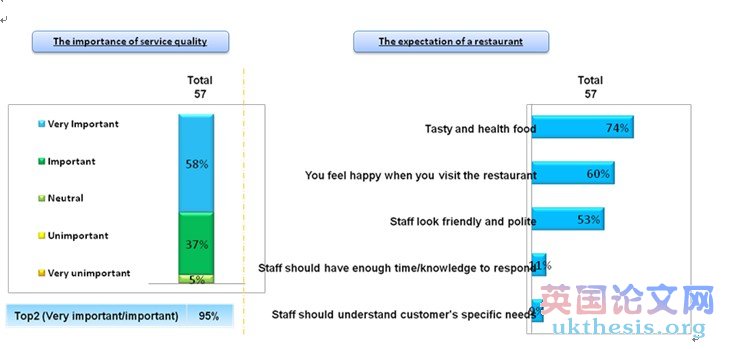
Consumers experience various service failures. In average there is about 1.5 kinds of failure. More failures come from service than from food quality.
However, waiting for a long time which is a service before meal surprisingly stands out as the No.1 complain (65%). Unwelcoming staff is the 2nd complained failure (51%). All these are higher than “overcooked or undercooked food” (35%). http://www.ukthesis.org/management/ Failure in service is common.
It is notable that many consumers don’t act aggressively against poor service, though their follow-up behavior also hurts the business of the restaurant. More consumers choose to “never back again and tell friends” (49%) or keep silent (13%) which potentially hurts the restaurant but restaurant actually are not aware of the failure service. Some consumers will give suggest (24%) and ask for compensation (15%).
Consumers expect the restaurant to be more active on explain and compensation. Apologize is expected. The compensation is not necessarily to be refund. The challenge for the restaurant is consumers might not express their dissatisfaction or communicate this with the restaurant, though they are dissatisfied. It is crucial for the restaurant to set channels to collect feedback from “quiet dissatisfied consumer” before that impacts the business.
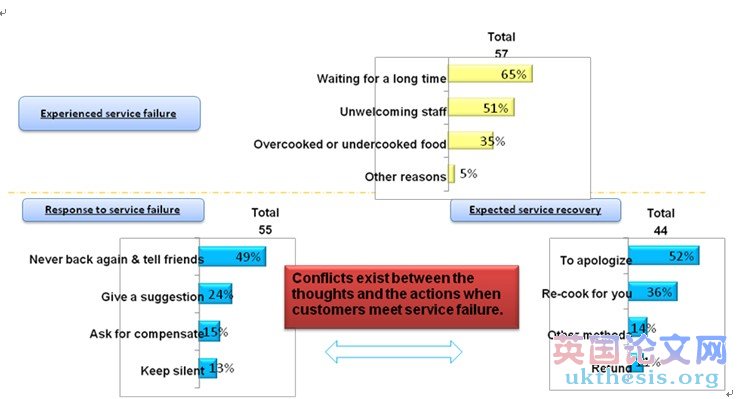
Part II: Restaurant’s Attitude to Service
Prompt response is thought the most important, followed by service skills and knowledge.
Restaurant managers well realize that failure mainly comes more from service instead of food: staffs don’t response timely is the key source of dissatisfaction. #p#分页标题#e#
All these are consistent with consumers’ feedback. It shows that managers do know what consumers care, what they want and don’t want.
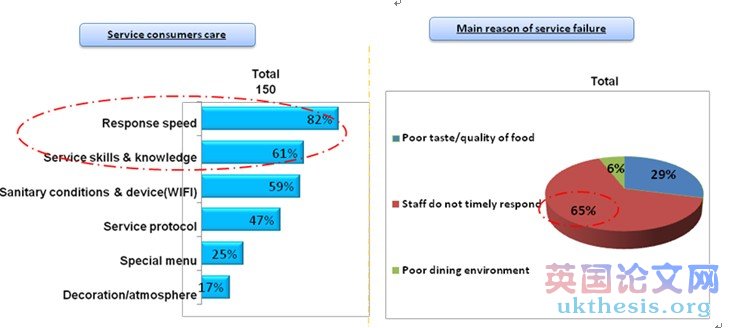
But their practice could not fully deliver their belief.
Almost all restaurants think they care consumers and collect consumers’ feedback.
But their ways of collecting feedback are informal and subjective. Their collection of consumer’s opinion relies a lot on staff: staff’s observation (38%) and staff checking with consumer (31%). Managers think staffs know if customers are satisfied or not. However, this assumes that all the staffs are sensitive enough to understand customer, capable of communicating and willing to accept either positive or negative feedback.
Only one third of the restaurants have adopted formal and objective ways to collect consumer’s feedback: offering customers a card to fill after dining. We feel that consumers’ feedbacks are not well collected in most cases. Dissatisfaction should be higher than manager’s expectation.
Managers just think that the staffs should monitor customer satisfaction.
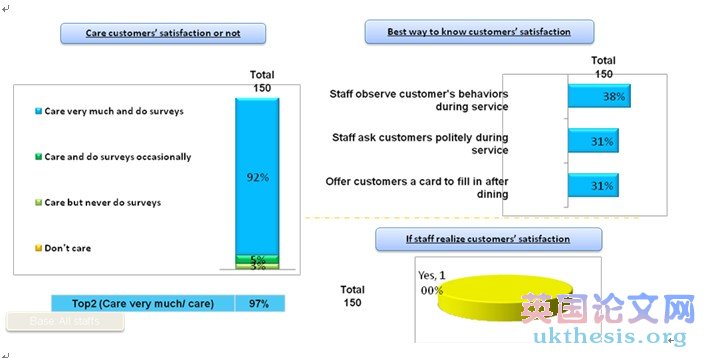
Having service consciousness and observing ability is regarded as the most important quality of staff. Communication skill and ability of understanding customers’ needs are also thought very important.
Most restaurants have rules on service and think their staffs’ behaviors are consistent with restaurant’s commitments.
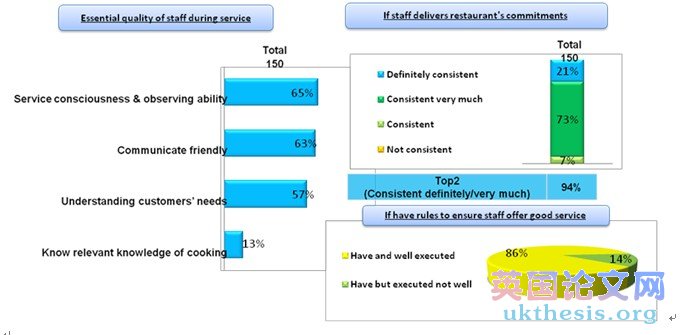
Given that there is no formal way to collect customer’s dissatisfaction/opinion, some consumers likely behave extremely if they are not satisfied. These behaviors will even worry the managers. The most concerned situation to managers is that customers complain loudly when they are not satisfied. This could influence other customers and impact the business. However managers do not concern a lot if customers keep silent or ask for compensation directly, though this also hurts the restaurant.
Most restaurants have certain dissatisfaction handle mechanism and compensation program for dissatisfied customers. Restaurants are willing to accept feedback and take the advice. Further actions include apology, offering a discount, re-cooking the dish and coupon. Managers think these actions could improve customer satisfaction most of the time.
The restaurants only deal with those who complain, but might neglect the more who don’t speak out loudly. Thus the mechanism here is more for solving the big problem instead of solving and preventing failure service.
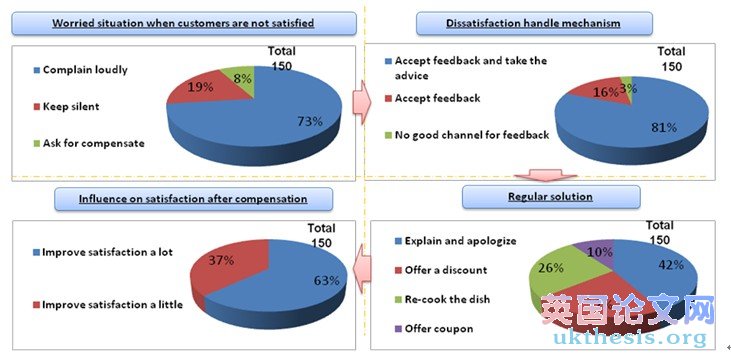
For failure service, the manager’s regular solution almost matches the service customers expected.
Managers seem to well know consumers’ expectation. Their current approach could improve satisfaction level from dissatisfied customer. The challenge is whether they can identify all the dissatisfied customers.
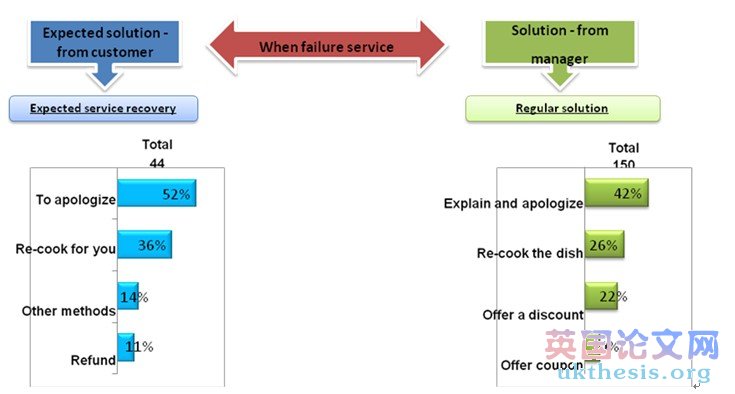
Most managers think customers’ loyalty is very important, and it also proportionate to the satisfaction.
They think meeting customers’ needs is the best way to maintain customers’ loyalty. .
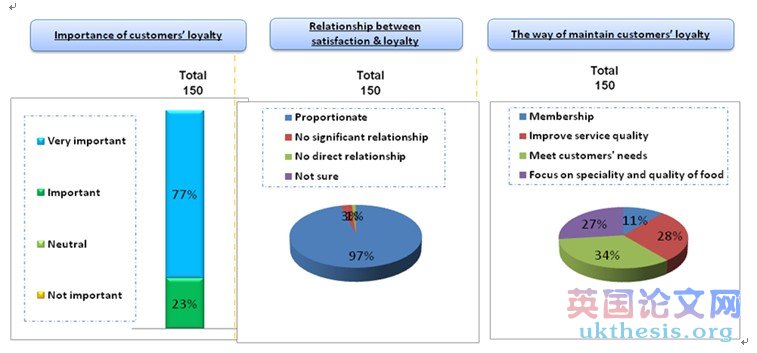
Regular customer accounts for more than 1/3 of business. Sustaining these consumers and building loyalty is important.
It also shows that those restaurants that have more regular customers provide better service.
They care more customer loyalty.
They provide better solution for failure service to improve customer satisfaction
More of them have rules to ensure staff offering good service.
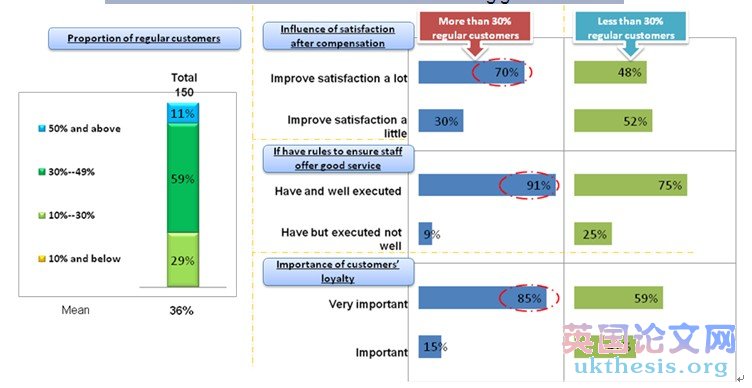
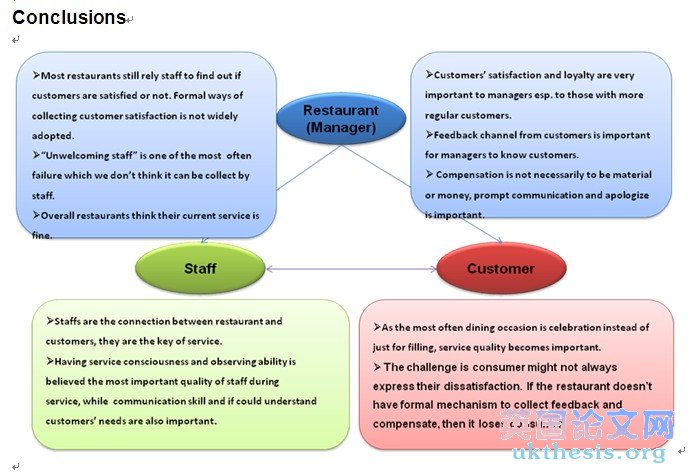
如果您有论文代写需求,可以通过下面的方式联系我们
点击联系客服